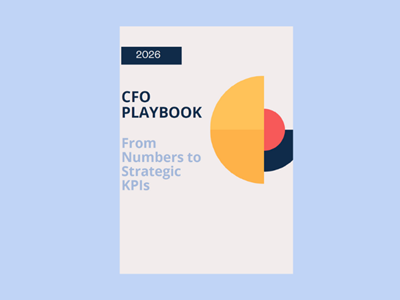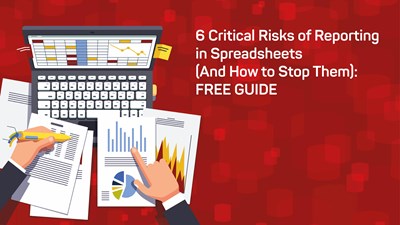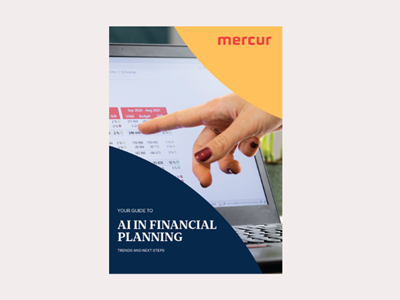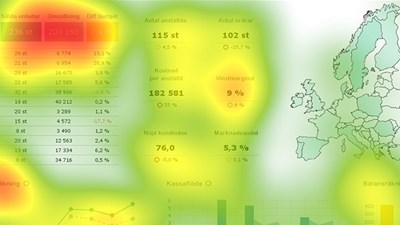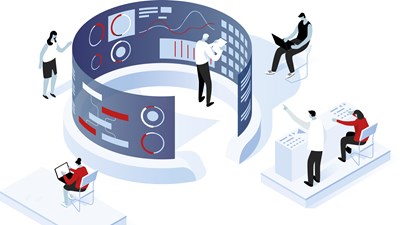
The Role of the CFO: Top Priorities and Responsibilities
The beginning of the year brought a sobering reality check as emerging tariff threats, mounting global tensions and a climate of uncertainty complicated the business sector. During these times, companies remain committed to deliberate growth and placement of technology adoption at the forefront of their agendas. At the same time, the expectations for modern CFOs are increasing.
Today's finance leaders steer more than just budgets and reports. Top CFOs deliver insights, drive growth, strengthen controls and shape the strategic direction. The digital transformation ramps up with the increase of corporate complexity, and so does the role of CFOs. They become indispensable in shaping future-ready businesses.
What Is a CFO?
A chief financial officer (CFO) is the senior executive responsible for overseeing a company's finances. They report directly to the CEO and the board. However, the role of CFO extends far beyond simply balancing the books. CFOs act as financial custodians and strategic partners, guiding crucial decisions on investments, business expansions, technology adoption and risk.
Traditionally, the CFO was seen as the gatekeeper for finance, but today, things are slightly different. Now, the role of CFO encompasses the following:
Digital leadership
Investor communication
Influence over nearly every area of the enterprise
What Does a CFO Do?
A CFO’s core task is to ensure the organisation’s financial health. This means that they should supervise their accounting and finance teams, oversee budgets and monitor cash flow. And maybe the most responsible part is ensuring that there is compliance with all accounting standards.
However, if we look deeper, the role deals with transforming financial insights into improved business outcomes. Some of the top priorities for CFOs cover the following:
Developing and enforcing financial policies
Reporting organisational financial performance to stakeholders and regulatory bodies
Implementing financial strategies in line with the company’s objectives
Advising the CEO and board on significant decisions, from funding to mergers and acquisitions
Maintaining strong controls, transparency and effective risk management.
The Main Responsibilities of a CFO
CFO responsibilities have broadened over time. Today, they focus on enabling the organisation to thrive despite the uncertainties and rapid changes. Currently, the top finance executive priorities are driving sustainable growth, proactively managing risks, adopting digital tools and supporting company-wide ESG initiatives. Let’s find out what should a cfo focus on.
Growth and Profitability
Growth and profitability remain central to the CFO's best practices. In this modern world, finance leaders must explore new revenue streams and foster innovation. This will surely deliver insights that allow agile responses to market changes. The role of CFO includes working with business units to:
Assess expansion opportunities
Guide capital allocation
Optimise product or service portfolios
Advice on mergers and acquisitions.
When talking about profitability, a CFO must possess vital scenario modelling, cost control and strong analytical skills. Every leader should be equipped with the insights needed to make sound and growth-oriented decisions.
CFOs must also ensure that their growth ambitions are balanced against sustainability. This way, the decisions that safeguard the organisation’s long-term health are supported.
Risk Management and Compliance
Modern CFOs are faced with a surge in risks. Practical and comprehensive risk management is required to deal with financial, regulatory and cyber threats, together with supply chain volatility. CFOs have to construct internal control frameworks, ensure compliance and equip organisations to respond decisively to emerging challenges. The broad level expectations now include the following:
Complete transparency
Strong risk culture
With the increase in regulation around data privacy, tax and ESG disclosures, CFOs secure the integrity of financial reporting and processes. They also oversee enterprise-wide risk strategies designed to protect both reputation and company assets.
Digitalisation and Real‑Time Data
Digital transformation is also among the CFO's priorities. This extends beyond automation, focusing on deploying tools that provide real-time visibility into performance indicators across the business. It’s important to point out that finance leaders who harness financial modelling, AI and cloud technologies remain agile and anticipate trends rather than simply reacting. This is why organisations that use real-time analytics can make quicker and better-informed decisions.
Today’s finance teams require systems that:
Centralise company data
Automatically track key performance indicators (KPIs)
Supply dashboards for finance and operations leaders.
ESG and Sustainable Practices
ESG (environmental, social and governance) reporting is now considered a regulatory requirement and a maker of competitive advantage. CFOs are responsible for the sustainability metrics by integrating ESG risk into planning and maintaining transparent communication with stakeholders.
It’s required to have technologies and processes that support the collection, analysis and disclosure of ESG data to meet these obligations. Forward-thinking CFOs enforce ethical governance, decarbonisation efforts and sustainable investment strategies while preparing the company for future regulatory demands.
Finance Technology
Automation, cloud solutions and analytics powered by AI are quickly changing the finance sector. Progressive organisations place finance technology at the centre of their process improvements. They streamline manual work, accelerate reporting and enable more precise financial forecasting. The outcome is faster decision-making, improved planning and greater responsiveness to opportunities and risks.
Leading CFOs promote technology that:
Integrates with existing systems
Is easy to implement
Delivers solid security and privacy
Ensures compliance.
Choosing the Right Finance Software for CFOs
One of the top CFO priorities nowadays is selecting effective finance software. Mercur Business Control is one of the leading solutions for budgeting, forecasting, planning, reporting and analysis. In our cloud-based application, you can connect multiple data sources, collaborate in your reports, 'capture forecasts and narrative' and deliver financial and operational insight.
By encouraging a data-driven organisation, it's easier to make informed decisions and, at the same time, focus on your business growth. We've helped 1000s of Mercur Business Control users manage costs and grow profits for over 40 years.
What’s Next for CFOs
Considering the role and CFO responsibilities today, they are bound to shape sustainable, resilient and technologically advanced organisations. The most effective financial leaders will encourage lifelong learning, digital skills and collaboration across executive teams. This is mainly due to the expectations for growth and transparency, as well as the rise of the ethical code.
Therefore, broadening finance executive priorities means using analytics, developing talent and encouraging innovation across all functions. If organisations wish to stay ahead, it means choosing a software offering accuracy and flexibility to support strong planning and rapid adjustment.
FAQs
What Does a CFO Do Day to Day?
A CFO will review financial reports, supervise cash flow and ensure decision-makers have timely, accurate data. They meet with departmental heads to monitor performance, manage risk and provide guidance on spending or investment. Their day-to-day work also involves analysing operational metrics and collaborating with the CEO and board on business strategy. Communicating with stakeholders regarding financial performance and major initiatives is also one of their daily tasks.
How Does a CFO Drive Growth?
CFOs deliver growth by directing capital towards promising investments. It’s their duty to identify new opportunities from data and lend support to product launches or expansion. They drive results by studying profitability, sharpening cost control and using advanced forecasting to spot potential risks or advantages. Working with other executives, they help establish competitive edges through prudent, data-driven judgment.
Why Is Digital Transformation Essential?
Finance digitalisation brings in real-time analytics, automation and reduced errors, freeing finance professionals for strategic work. Companies with digitally mature finance functions can move rapidly and adapt to disruption more effectively. New technologies such as AI and process automation open the way for better scenario modelling and more accurate forecasting.
Find out how Mercur Business Control can help you organisation grow!
 Blog
BlogTop PowerBI Alternatives in 2025
Explore the top PowerBI alternatives for 2025. Discover how Mercur delivers integrated planning, budgeting and reporting without the high cost and complexity.
 Blog
BlogFP&A Trends Shaping Financial Planning in 2025
Many organisations cope with fragmented planning and data quality issues, which slow down their forecasting cycles. This forces organisations to take practical steps to turn ambition into execution.
 Blog
BlogScenario Planning - Better control during uncertain times
Uncertain times create the need for more frequent forecasts and time for analyzing and comparing different future scenarios. We give you 5 tips on how to simulate future scenarios using scenario planning
 Blog
BlogA practcial guide to scenario planning
Scenario planning gives you a clear, practical way to test assumptions, spot risks and opportunities, and make better strategic choices so your organisation stays resilient when conditions change.
 Blog
BlogCFO Playbook - KPIs for 2026
The role of the CFO is changing fast. Today, the finance function is expected to deliver more than reports — it must drive direction, speed and profitability through clear, actionable KPIs. Learn more in this guide.
 Blog
BlogHow can AI help CFOs make better decisions?
Artificial Intelligence (AI) has significant potential to enhance decision-making for Chief Financial Officers (CFOs) by providing data-driven insights, automating routine tasks, and enabling more accurate forecasts.
 Blog
BlogSpreadsheets Risk the Future of the Business
Spreadsheets often start as just a list for storing information and there is minimal process documentation, support or maintenance for these worksheets. Despite the fact that desktop applications such as Microsoft Office are included in the standard configuration of users' PCs, very little formal training is ever given to spreadsheet users.
 Blog
BlogRolling Forecasts: Practical Steps, Benefits, and How to Get Started
Financial planning has changed. Traditional annual budgets can’t keep up with rapid shifts in the market, evolving customer needs, and internal performance dynamics. That’s why many finance teams are turning to a rolling forecast model.
 Blog
BlogThe Powerhouse of EPM Tools
A business’s success heavily relies on having a strong strategy. However, what's even more important is implementing that strategy while tracking and measuring the performance. This can easily be done by investing in enterprise performance management (EPM) software.
 Blog
BlogMastering Spreadsheets
Where many businesses start small, a simple spreadsheet can adequately perform the limited tasks required of it. As the company grows, your spreadsheets can get more complex and harder to manage, by which point it feels like it will be too difficult to move to a different reporting tool.
 Blog
BlogBuild Long-Range Planning for Business Success
Discover how effective long-range planning aligns strategy, finance and operations for smarter decisions and sustainable growth.
 Blog
BlogWhat Is Planning, Budgeting and Forecasting?
Planning, budgeting and forecasting are rarely static. Shifts in the industry often require you to revisit assumptions, adjust targets and adopt new processes. Learn how to strengthen your approach and stay ahead of change.
 Blog
BlogZero-Based vs. Incremental Budgeting
Budgeting sits at the heart of sound financial management. This is why choosing the right technique is crucial for CFOs – it shapes resource allocation, cost control and strategic agility. Incremental and zero-based budgeting are two leading methods that offer distinct approaches.
 Blog
BlogBetter Revenue Planning
Sales forecasting is the process of predicting future revenue based on past data and trends. Read the blog to learn the best methods to do it right.
 Blog
Blog3‑Statement Model for Better Financial Forecasting
Financial forecasting is critical for any business that wants to adapt to change. But finance teams keep usingfragmented models and manual processes. The 3-statement financial model is the solution.
 Blog
BlogTop 7 Manager KPIs for Financial and Operational Success
In today's post we'll break down why KPIs matter, which ones offer the most insight for finance and executive teams and how to ensure they're actually driving results.
 Blog
BlogCash Flow Forecasting
Inaccurate cash flow forecasting can be a costly mistake for companies. In today’s volatile market, relying on static annual budgets or manual spreadsheets leaves financial leaders without the agility to respond to uncertainty.
 Blog
BlogAI in Finance as a Powerful Tool
In this post, we explore how AI is evolving from a theoretical concept into a valuable resource for decision-making. Get useful insights for finance teams at any stage, from early exploration to actively using AI-powered solutions.
 Blog
BlogBalancing Profitability and Sustainability
Sustainability has become a central concern for organisations across the world — and the UK is no exception. This evolving landscape places new demands on financial reporting.
 Blog
BlogAI in corporate budgeting
Artificial Intelligence (AI) can support decision making in key areas such as budgeting, capital allocation and even corporate strategy and as a result, it is increasingly being deployed in corporate performance management tools (CPM).
 Blog
BlogFrom static budgets to agile financial management
Traditional budgeting has long been the cornerstone of financial planning in businesses. But today it can become more of a limitation than a strength. That’s where the concept of Beyond Budgeting comes in.
 Blog
BlogThe Business Benefits of Integrated Business Planning
This blog explores what IBP is and the typical IBP process. We highlight business benefits and how the right software can be a game-changer for your organisation.
 Blog
BlogThe Collaborative, Smarter Budget
In many organisations manual budgeting processes over-burden staff and create masses of data which overwhelms department heads and stops them seeing the bigger picture.
 Blog
BlogBudgeting in a modern world
Thirty years after its debut, Microsoft Excel is still the preferred tool for budgeting and planning projects. However, its popularity is declining, due in most part to the rise of technology and subscription-based pricing for a myriad of SaaS-based products.
 Blog
BlogHow to succeed with your planning, budgeting, and forecasting process
We know it can be challenging to succeed with your planning, budgeting, and forecasting process. Therefore, we have gathered our best tips for you to succeed!
 Blog
BlogHow do finance teams track KPIs across the entire organisation?
Learn how finance teams track KPIs across the entire organisation by consolidating data from multiple sources into a unified system like Mercur.
 Blog
BlogInformed Business Decisions at Maximum Velocity
The ability to process information swiftly is essential. If your business can’t manage your data efficiently, your company’s financial performance will surely underperform. At Mercur we have developed our own database Veloxic which helps Financial Planning and Analysis.
 Blog
BlogWhat is Corporate Performance Management? (CPM)
CPM, or Corporate Performance Management, is a process within corporate management aimed at measuring and optimizing the performance of an organization. CPM encompasses a range of activities, including budgeting, planning, forecasting, reporting, and analysis.
 Blog
BlogHow EPM Transforms Financial Planning and Forecasting
Struggling to keep plans aligned in a changing market? Discover how EPM helps finance teams move faster, stay accurate and lead with real-time insights.
 Blog
BlogThe Hidden Cost of Data Silos
If you ever feel like your teams speak different languages when it comes to data, it is a classic symptom of data silos. The information gets stuck in one department, system or tool, making it difficult for anyone to see the full picture.
 Blog
BlogHow To Create a Successful Budgeting Process
When done well, budgeting helps organisations stay financially on course, even when things don’t go exactly as planned. Learn how to keep things on track so you avoid surprises and stay focused on your goals.
 Blog
BlogSpreadsheet Risk Management: Best Practices for 2025
Excel has long been a target for hackers; just one click on a malicious attachment can infect your entire network. So, how can you keep using spreadsheets while not sacrificing your safety?
 Blog
BlogAI in Financial Planning: Trends and Next Steps
Discover how finance teams are using AI to drive smarter planning, faster insights, and stronger business decisions.
 Blog
BlogBest Guide to Improve Your Revenue with Flexible Budgeting
Optimise your expenses with flexible budgeting, and learn how to adjust budget to reflect current business activities, market changes and cost fluctuations.
 Blog
BlogHow to Effectively Budget with Driver-Based Forecasting
Traditional models of forecasting rely on historical data and beliefs. It uses techniques that identify patterns, which are simple to use. However, with these methods, there are some challenges because they are not dynamic with today’s market, and can’t effectively analyse complex data.
 Blog
BlogRisks with working in spreadsheets
Spreadsheets are an essential tool for all types of organisations and businesses rely on them heavily, particularly for financial computations. The most popular spreadsheet program globally is, of course, Microsoft Excel, it’s used by an estimated 750 million people.
 Blog
BlogBoost Report Readability, Engagement, and Decision-Making
In today’s fast-paced business environment, effective reports and dashboards are crucial for decision-making. Our user study using eye-tracking technology revealed seven key insights into what captures attention.
 Blog
BlogTop-Down vs Bottom-Up Budgeting
Budgeting aligns resources with strategic goals, and there are two primary approaches: top-down and bottom-up. Which method wroks best?
 Blog
BlogHow Automated Reporting Will Transform FP&A in 2026
This article highlights the power of report automation, how to implement it in your business and explores any new opportunities for accurate financial analysis in the long run.
 Blog
BlogWhat Is FP&A? Definition, Purpose, and Best Practices
Without solid financial planning and analysis (FP&A), businesses operate in the dark. In this post we go deeper into the process of FP&A and why it’s important for businesses.
 Blog
BlogHow to get accurate financial reports without waiting for month-end
You don't need to wait until month-end to see accurate financial reports. With modern financial systems you can access up-to-date reports whenever you need them.
 Blog
BlogWhat is management reporting?
Management Reporting refers to the process of creating, analyzing, and presenting information about various aspects of an organization's performance to enable decision-makers to make well-informed decisions about the future.
 Blog
BlogBusiness Budgeting Software: How to Choose the Right One
Choosing budgeting software is partly a finance and partly a strategic decision. The right tool helps organisations organise planning cycles, adapt as the market changes and increase accountability across departments. But not every platform will be a good fit.
 Blog
BlogVariance Analysis: A Comprehensive Guide
Senior executives are demanding more detail in their management reports. The amount of data available to finance departments has exploded and decision makers see this as an opportunity to get more insight into how the business is performing.
 Blog
BlogBusiness Intelligence Reporting For Finance Teams
The real challenge today isn’t collecting data, it’s making sense of it and fast. Organisations turn to business intelligence (BI) to convert raw data into insight.But how do you actually do it right?
 Blog
BlogSave time and create a successful budget process
If you’re working in a large organization, you’re probably aware of how time-consuming the budget process can be. In this article we’ll give you tips on how to save time and still create a successful budget process
 Blog
BlogSpreadsheets are not Collaborative Tools
Spreadsheets were never designed for collaboration, yet they are the single most used program among teams and co-workers. They often start out as a quick document for storing, formatting or calculating information but evolve into important documents and are often the core records for an organisation.
 Blog
BlogAI and Machine Learning, what is it, and why is it important for the future?
Artificial Intelligence and Machine Learning, what is it, and what is the difference?
 Blog
BlogWhy is our Excel-based budget always out of date?
Excel creates outdated budgets. Every time someone enters a figure, sends a file, or waits for another department to finish their section, your budget falls further behind reality.
 Blog
BlogManagement Reporting Guide: Definition and Tips
Management reporting helps you see what’s really happening in your business. In this guide, we’ll explain what managerial reporting looks like and share practical tips.
 Blog
BlogFive tips for a successful budget process!
How can you make your budget process more successful and maximise the effort that was invested in creating it? Of course, there are many factors to consider but we’ve chosen to highlight five key areas that will enable and help you create a smoother, value-creating and collaborative budget process.
 Blog
BlogWhy xP&A is a powerful game-changer
The newest iteration of planning, analysis and reporting systems is a powerful game-changer that unites company departments and boosts competitiveness. It’s called xP&A – the abbreviation of extended financial planning and analysis.





